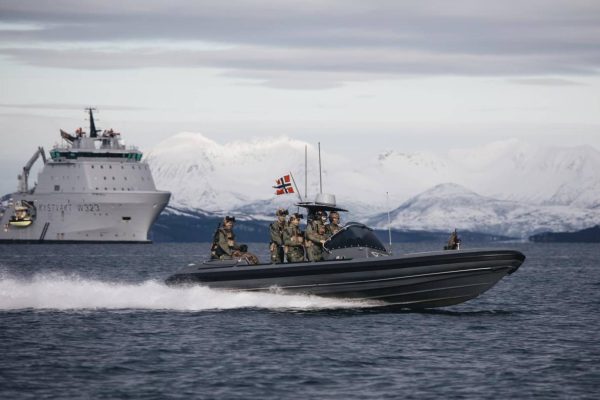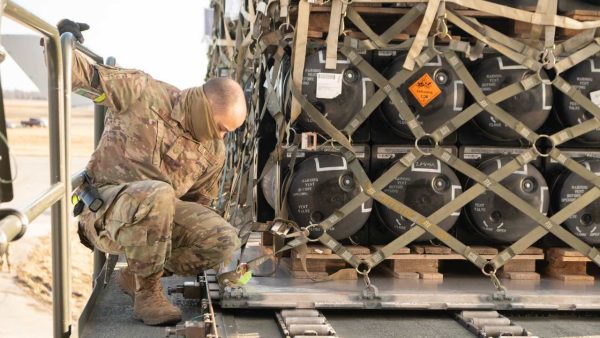With the successful House of Representatives vote on Ukraine aid behind us, the Senate and the White House will move quickly to put the $61bn package into law. No doubt the US military has already been pre-positioning ammunition and equipment so it can deliver key elements of aid as soon as possible.
This was a key moment in ways that not everyone has grasped and reveals significant positives. Some 71% of House members voted in favor, reflecting resounding bipartisan US support for Ukraine at both the political and popular levels. Several congresspeople favoring passage highlighted the growing connections between Russia, Iran, and China, a new axis of authoritarians who are actively working together. This is a clear-eyed assessment of the threat facing the free world.
In addition, former President Trump gave political cover to Speaker Johnson to proceed with this legislation when they met on April 12. This is a clear sign that if elected President again, Trump does not want to inherit a disaster. While he wants peace, he wants peace through strength, not peace through weakness and capitulation.
So much for the good news. The bad news is that the delays and difficulty in passing the aid bill put US national security at risk and should serve as a warning: this process cannot be allowed to drag on.
We must no longer give Ukraine just enough to survive, but not enough to win. A Ukrainian victory is essential to reestablish peace in Europe, to deter Chinese aggression in Asia, and to reinforce Iranian worries about attacking Israel ever again. Several measures should be taken immediately:
- The Biden Administration must clearly and unequivocally back up President Biden’s statement of December 12: “We want to see Ukraine win the war.” America’s objective is a Ukrainian victory. This message needs clear and consistent repetition from the highest levels of the US government and must be backed up with the policy decisions necessary to make this a reality. There must be no equivocation with the President’s words. We must have strategic clarity. Lower-ranking American officials must stop avoiding the words “win,” “victory,” and “Russian defeat.”
- Now that funding is assured, the US military should flood Ukraine with massive quantities of arms and ammunition, as quickly as possible. The Russian military is in a very weak condition, with poor equipment, training, morale, and leadership — but it has made gains in recent months due to Ukraine’s lack of ammunition. Russian forces need to feel a bit of “shock and awe” to understand that the battlefield has now changed, and that time is not on their side. We need to begin deterring Russia against further aggression, rather than assuring it that we seek to avoid “escalation.” Rather than worrying about what Putin might do, Putin should worry about what we might do.
- As part of this, the Biden administration must lift all artificial and self-imposed limits on aid to Ukraine. The US should provide Ukraine with its longest-range ATACM ballistic missiles, which can reach Sevastopol, the Kerch Strait bridge, and Russian logistical concentrations well behind the front lines. It should stop declaring Russian territory as “off-limits” for Ukrainian targeting, and instead urge Ukraine only to hit militarily relevant targets, which is consistent with international law. It should declare already decommissioned aircraft sitting in the Arizona desert as Excess Defense Articles and begin providing A-10 ground attack aircraft, F-16 combat aircraft, and other airframes to Ukraine in order to build a properly scaled Ukrainian air force that can deny Ukrainian airspace to Russian aircraft.
- The administration should work closely with Turkey, Romania, and Bulgaria (our Black Sea NATO allies) to expand de-mining capacities and engage in freedom of navigation operations in the Black Sea. Under the Montreux convention, non-belligerent nations can bring warships into the Black Sea for 21 days at a time. This should allow for a persistent presence in the region to deter Russian attacks on commercial shipping.
- France, the United States, the UK, and other NATO allies should form a “coalition of the willing” to directly assist Ukrainian defense of its cities, civilians, and non-military infrastructure from drone, missile, and rocket attacks — just as they did recently with Israel. This can be done by establishing together with Ukraine a “cordon sanitaire” in Ukrainian airspace adjoining NATO. This could be done from NATO territory only, or also within Ukraine itself. Hitting unmanned vehicles that are only aimed at harming Ukrainian civilians and, for example, their power plants, and present a risk to neighboring NATO territory, does not require nations to engage Russian forces directly. It only requires engaging in the humanitarian protection of civilians, as well as preventing any accidental strikes on NATO territory. Such a cordon could extend hundreds of miles into Ukrainian airspace and increase the protection afforded to Lviv, Odesa, and Kyiv while relieving the country’s overworked and under-armed missile crews.
- The United States should begin to build consensus within NATO for increasing burden-sharing in support of Ukraine by turning the Ramstein military assistance process into a NATO clearinghouse mechanism and establishing a fund, as proposed by Secretary General Jens Stoltenberg, to provide consistent military support to Ukraine despite the hiccups in US and European processes. The United States should contribute to this fund, but it should be based on the same percentages assigned to funding for other NATO budgets, i.e., a contribution of around 20%.
- The United States should also begin building consensus within NATO for an invitation at the July Washington Summit for Ukraine to begin talks about its accession to NATO as soon as possible. Such an invitation is essential: to tell Vladimir Putin that he will never defeat Ukraine; to help provide a Ukraine victory strategy; and to lay the foundation for a future European peace settlement.
- The US Congress should move swiftly to approve a lend-lease facility for Ukraine up to $500bn. US assistance to Ukraine is necessary and appropriate, but to avoid gaps in available funding in the future, Congress should pre-position authority for Ukraine to borrow from the US for its defensive needs. This is how the United States saved Great Britain in World War II, and it is entirely appropriate today in the case of Ukraine. Such a move would also signal to Putin that we can outlast and outspend Russia no matter what he does – so his adventure in Ukraine must come to an end.
The House of Representatives vote is a watershed, but it does not assure victory and peace in and of itself.
It now must be followed by decisive action from the US administration to bring about a Ukrainian victory, and in so doing, to re-establish the conditions for permanent peace, prosperity, and security across Europe, and to re-establish deterrence on that continent, the Middle East, and Asia.
The consequences of failing to do must not be underestimated, because they could be dire.
Ambassador Kurt Volker is a Distinguished Fellow at the Center for European Policy Analysis (CEPA.) A leading expert in US foreign and national security policy, he served as US Special Representative for Ukraine Negotiations from 2017-2019, and as US Ambassador to NATO from 2008-2009.
Europe’s Edge is CEPA’s online journal covering critical topics on the foreign policy docket across Europe and North America. All opinions are those of the author and do not necessarily represent the position or views of the institutions they represent or the Center for European Policy Analysis.





